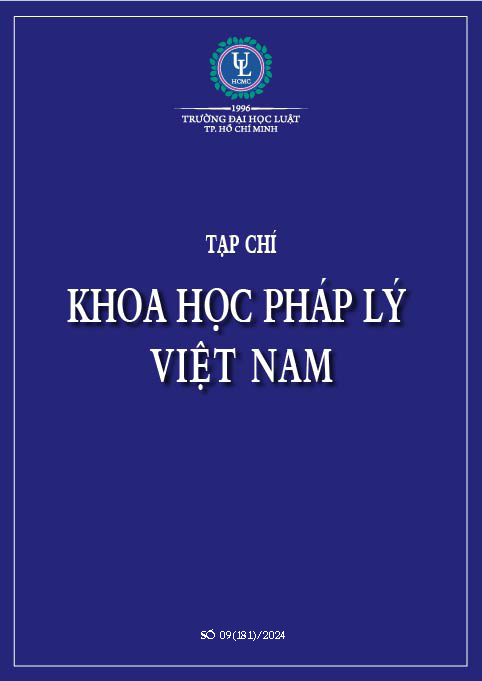BÀN VỀ PHÁT TRIỂN QUY PHẠM ĐẠO ĐỨC TRONG TIẾN TRÌNH XÂY DỰNG PHÁP LUẬT VỀ TRÍ TUỆ NHÂN TẠO
DOI:
https://doi.org/10.70236/tckhplvn.115Từ khóa:
trí tuệ nhân tạo, quy pham đạo đức AI, quy định pháp luật, bộ quy tắc đạo đức, luật mềmTóm tắt
Trí tuệ nhân tạo (artificial intelligence, AI) đang dần thâm nhập sâu rộng vào đời sống xã hội toàn cầu, với tiềm năng cách mạng hóa nhiều ngành công nghiệp như chăm sóc sức khỏe, tài chính, và giáo dục. Tuy nhiên, việc triển khai AI rộng rãi đặt ra các vấn đề đạo đức như xâm phạm quyền riêng tư, thiên lệch và thông tin giả mạo, đòi hỏi sự điều chỉnh pháp luật. Trong bối cảnh này, các quy tắc đạo đức đóng vai trò quan trọng, tạo nền tảng cho một khung pháp luật linh hoạt và đáng tin cậy về AI, có thể điều chỉnh kịp thời theo sự phát triển của công nghệ
Tải xuống
Tài liệu tham khảo
[1] Jobin Anna, Ienca Marcello, Vayena Effy, “The global landscape of AI ethics guidelines”, Natural Machine Intelligence, Vol. 1, 2019
[2] Попова Анна, “Этические принципы взаимодействия с искусственным интеллектом как основа правового регулирования” [trans: Popova Anna, “The Interplay of Ethics and Artificial Intelligence as a Foundation for Legal Regulation”], Правовое государство: теория и практика, Vol. 61(3), 2020
[3] Matthias Artzt & Tran Viet Dung, “Artificial Intelligence and Data Protection: How to Reconcile Both Areas from the European Law Perspective”, Vietnames Journal of Legal Sciences, Vol. 7(2), 2022
[4] Ryan Browne, “World’s first major law for artificial intelligence gets final EU green light”, CNBC News, 21/05/2024
[5] Burle Caroline & Cortiz Diogo, “Mapping principles of Artificial Intelligence”, Sao Paulo: Nucleo de Informacao eCoordenacao do Ponto BR, 2019
[6] Margarita Robles Carrillo, “Artificial intelligence: From ethics to law”, Telecommunications Policy, Vol. 44(6), 2020
[7] Stix Charlotte, “Foundations for the future: institution building for the purpose of artificial intelligence governance”, AI Ethics, Vol. 2, 2022
[8] Luciano Floridi & Josh Cowls, “A unified framework of five principles for AI in society”, Harvard Data Science Review, Vol. 01(01), 2019
[9] Камалова Гульфия Гафиятовна, “Правовые и этические принципы регулирования искусственного интеллекта и робототехники” [trans: Kamalova Gulfia Gafiatova, “Legal and ethical principles governing AI and robotics”, Право и государство: теория и практика, Vol. 202(10), 2021
[10] Andrew J. Hawkins, “Tesla’s Autopilot and Full Self-Driving linked to hundreds of crashes, dozens of deaths”
[11] Daniel Howley, “Google Photos Mislabels 2 Black Americans as Gorillas”, Yahoo Tech
[12] Nguyễn Hoàng Thái Hy & Lê Tấn Phát, “Rủi ro từ giao dịch tự động trên sàn giao dịch tiền mã hóa nằm ngoài ý chí của các bên – “lẽ công bằng” có phải là giải pháp?”, Tạp chí Khoa học pháp lý Việt Nam, số 10(170), 2023 [trans: Nguyen Hoang Thai Hy & Le Tan Phat, “Risks from Automatic Transactions on Cryptocurrency Exchanges Beyond the Will of the Parties – Is ‘Equity’ the Solution?”, Vietnamese Journal of Legal Sciences, Vol. 170(10), 2023]
[13] D. Jin (Ed.), Reconstructing Our Orders: Artificial Intelligence and Human Society, Springer, 2018
[14] European Parliament, “Artificial Interligence Act (Briefing)”
[15] Boddington Paula, Towards a Code of Ethics for Artificial Intelligence, Springer International Publishing, 2017
[16] Hagendorff Thilo, “The Ethics of AI Ethics: An Evaluation of Guidelines”, Minds & Machines, No. 30, 2020
[17] Jiabao Wang, Xiaoyu Yu, Jie Li, Xiaoling Jin, “Artificial Intelligence and International Norms”, in Donghan Jin (ed.), Reconstructing Our Orders, Springer, 2018
[18] Wischmeyer, T., Rademacher, T. (eds), Regulating Artificial Intelligence, Springer; Mihaela Constantinescu, “AI, moral externalities, and soft regulation”, 2021
[19] Gregory Yalt, “Inside the final seconds of a deadly Tesla Autopilot crash”, Washington Post






